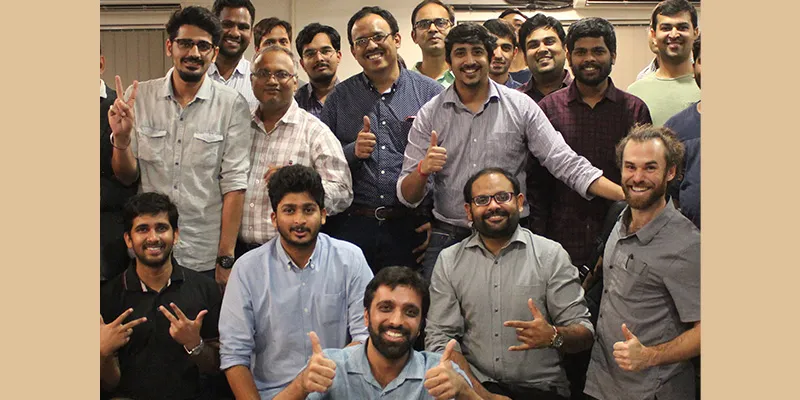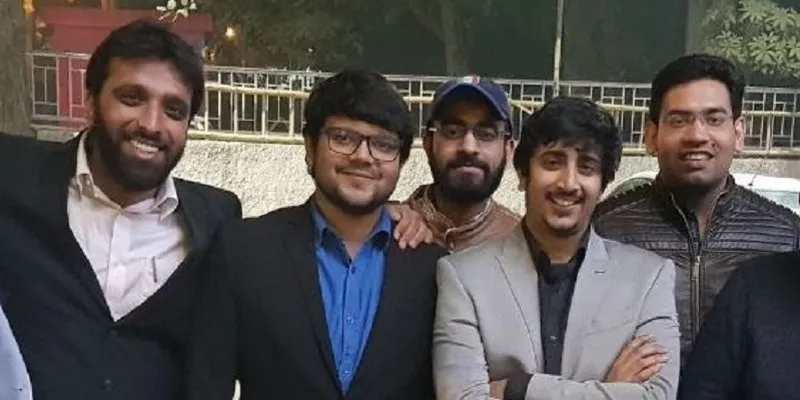WATCH: Blockchain is about bringing power back to the people, says founding member of Blockchainedindia.com
Blockchain is the technology of the future. Akshay Aggarwal, Kumar Anirudha, and Manav Ailawadi, founding members of Blockchainedindia.com, an 18,000-member-strong network of developers, tell YourStory Business Editor Vishal Krishna how this tech can democratise information and change the world.
The internet changed the world by making information available to all. Decades later, blockchain is revolutionising the way the world looks at transparency and security. And with the World Economic Forum predicting that 10 percent of the global GDP will be stored on Blockchain by 2027, India is focusing on this technology like never before.
Leading the charge is a group of 10 youngsters who banded together to set up not-for-profit organisation Blockchainedindia.com. Akshay Aggarwal, Kumar Anirudha, Manav Ailawadi, Advaith Mohan, Karthika Sivakumar, Kashyap Kompella, Vikas Singh, Lakshay Anand, Stefano Colombu, and Chinmay Shah - all blockchain enthusiasts - would meet up regularly in 2016 to discuss the practical applications of the file-based distributed ledger system.
Three years down the line and with more than 18,000 engineers signed on to their network they hope to create a large data repository of blockchain knowledge, including videos and wallpapers, for Indians.
In this video interview, Akshay, Anirudha, and Manav reveal how they started their blockchain journey, how distributed ledger technology can change lives, and explain why payment tokens and smart contracts are the future.
“We began as a small working group of four people. We used to meet up every week, and it was just about learning. But we were learning so fast that we wondered why not open up this forum to everyone else. That is how the journey began for us,” reveals Akshay, Community Manager and part of the founding team, at BlockchainedIndia.com.
He goes on: “We started this because several blockchain conferences were only talking about cryptocurrencies, which is a payment layer on blockchain, rather than about blockchain as a technology that can enable several applications.”

BlockchainedIndia.com team
His co-founder, Manav, agrees wholeheartedly:
“There is more to this technology than just trading cryptocurrencies and making money. It is about bringing power back to the people. The beauty of this technology is the transparency it brings to everything and the social impact it can create.”
Also read: Confusion over cryptocurrency casts a shadow over the growth of Blockchain in India
The power of networks
Their network offers ample knowledge on a topic that is still not well understood, including white papers such as Blockchain: The Solution For Transparency In Product Supply Chains (by Project Provenance), and Blockstack: A Global Naming and Storage System Secured by Blockchains.
The knowledge sharing in the network led to the birth of Blockchain apps such as Masmic, Majime, Bank of Hodlers, Matic, and Cypher Rock.
Anirudha says: “There have been pilot projects. People these days are very conscious about what they are consuming, where their food is coming from. Is that apple from Kashmir or Shimla? What pesticide has been used on the tea they sip?” There are umpteen questions, and the not-for-profit believes that there is one answer: blockchain.
From just 20 attendees at the first event in early 2017, the not-for-profit organisation now has more than 1,000 people attending its blockchain developer conferences. Most events are held at co-working centres or colleges, and the organisation isn’t eyeing only sponsorships or money. One of their biggest events was held at IIT-Delhi last year where Consensys India, a developer platform for Ethereum, showcased their India chapter. Over 1,000 people attended the event.
Also read: The Blockchain divide: why large corporates are delinking it from the crypto world?
Incentivising people for change

With more than 100 meetups behind them, Blockchainedindia.com is encouraging developers/builders to come on to their platform for knowledge and to ultimately launch their apps.
“We are building a network where humans have to understand digital assets; this means that in the future incentivising can go beyond money,” says Manav, also a Community Manager at Blockchainedindia.com.
Akshay acquiesces. “The network on a Blockchain says that it can be aligned to goals such as protecting the environment by incentivising citizens to be part of a network that tracks cleanliness of a city or a locality. Blockchain aims to decentralise systems of information and create a consensus mechanism among institutions of individuals who can come together for an agreed agenda. It is the first time economics, computer science, and sociology have come together.”
At its core, Blockchain is like the https technology that powers your browser; it is a file system that creates ledgers for a public or private network. It has two parts: smart contracts and payment tokens. The former is a distributed ledger technology (Hyperledger, Lisk, QTum) while the latter is a payment system that supports cryptocurrencies like Bitcoin, Ripple, and Stellar.
“Engineers and software aficionados should use this technology. If they know languages like Python and Java, they can build applications on Blockchain,” Anirudha says.
The world has its eyes trained on Blockchain, with biggies like Walmart, Infosys, M&M, and IBM building their own apps. Amid all this, the founders of Blockchainedindia.com continue to work on their own startups as they focus on building a network that can make India a Blockchain nation.
Watch the video here:
Also read: More than a buzzword: How Blockchain is redefining top industries across the globe







